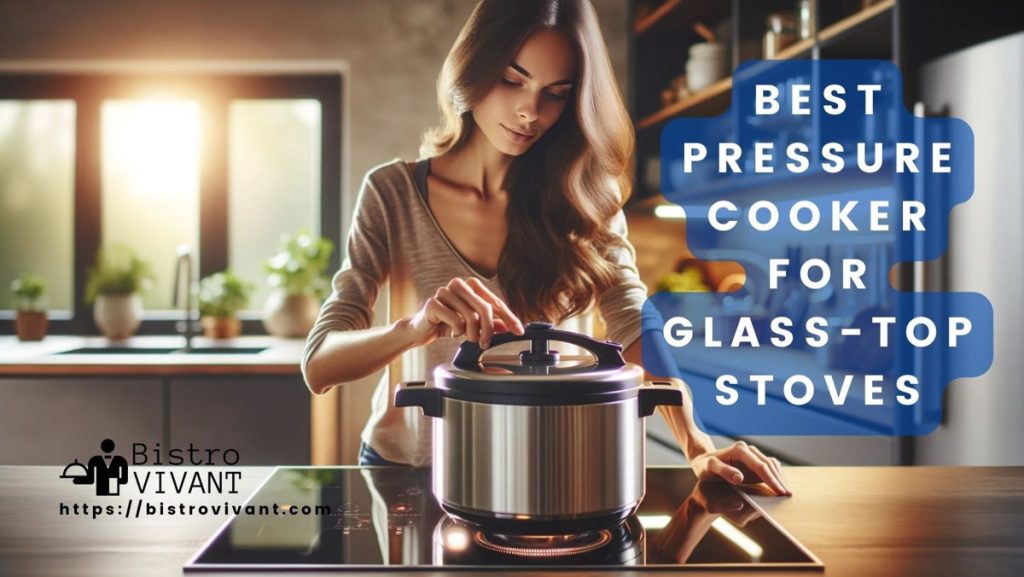When it comes to whipping up delicious meals in a jiffy, a pressure cooker is a home cook’s best friend. But hold on; if you’re the proud owner of a glass-top stove, not just any pressure cooker will do. You need the best pressure cooker for a glass-top stove. Why? Glass-top stoves are like the high-maintenance celebrities of kitchen appliances—stylish yet demanding a certain level of care and compatibility.
In this comprehensive guide, we’re not just talking about pressure cookers. We’re zeroing in on the crème de la crème—from the best canning pressure cooker for a glass top stove to the best pressure cooker for canning, and from the traditional best stovetop pressure cooker to the modern marvel, the best instant pressure cooker.
Our journey will unveil the top picks that marry perfectly with your glass-top stove, ensuring safety, efficiency, and culinary excellence. Get ready to discover the pressure cooker that doesn’t just meet your cooking needs but also cherishes your glass-top stove as much as you do.
Understanding Glass Top Stoves
When you’re on the hunt for the best pressure cooker for a glass-top stove, it’s crucial to understand what sets these stoves apart. Glass-top stoves are not just about their sleek and modern aesthetic; they come with a set of unique features that make them quite distinct from their coil or gas counterparts.
The smooth, flat surface is one of the main attractions, offering a clean, streamlined look in the kitchen. But it’s not just about looks; this flat surface also makes cleaning a breeze—a simple wipe-down, and you’re done.
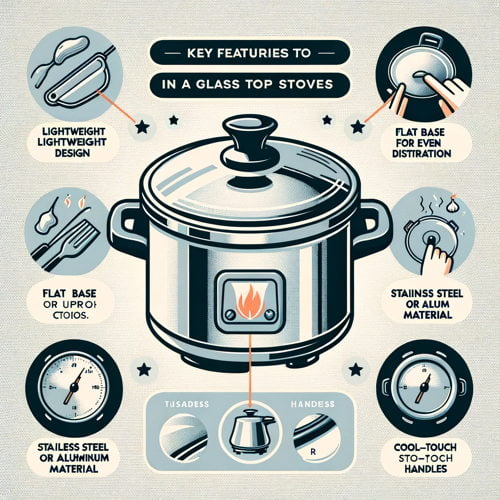
However, glass-top stoves require a bit more care when it comes to cookware. The glass surface can be susceptible to scratches and cracks, especially if you’re using heavy or uneven cookware. This is where the search for the best canning pressure cooker for a glass-top stove becomes relevant. Canning requires a pressure cooker that’s not only efficient at preserving your fruits and veggies but also gentle enough to maintain the integrity of your glass stovetop.
Models you should look for
When considering the best pressure cooker for canning, it’s important to look for models with a smooth, flat base. This ensures an even distribution of heat and reduces the risk of damaging your stove’s surface. Additionally, a pressure cooker with a lighter build is preferable, as heavy cookware can be a risk factor for glass-top stoves.
Moving beyond canning, it’s also essential to distinguish between the best stovetop pressure cooker and the best instant pressure cooker options. Stovetop pressure cookers offer a more traditional cooking experience and typically provide a greater level of control over the cooking process. However, for glass-top stoves, you’d want a stovetop cooker with a smooth base and lighter build.
On the other hand, the best instant pressure cooker is an all-electric model that sits on your countertop, eliminating any concerns about stove compatibility. These cookers are incredibly convenient, offering a variety of functions in a single appliance. However, for those who prefer the hands-on approach of stovetop cooking, finding a compatible and safe pressure cooker for their glass-top stove remains a priority.
Key Features to Look for in a Pressure Cooker for Glass-Top Stoves
When it comes to picking the best pressure cooker for your glass-top stove, the devil is in the details. It’s not just about how fast it cooks your beef stew; it’s about finding a cooker that treats your stove right while doing its job efficiently. So, what should you keep an eye out for? Let’s break it down:
Weight Matters
First up, weight. Glass-top stoves are like the high-heeled shoes of the kitchen—stylish but not built for heavy lifting. A heavy pressure cooker can be a no-go, as it can crack or damage the glass surface. Opt for a cooker that’s light enough to handle easily but still feels substantial. Think of it as a featherweight boxer—light on its feet but still packing a punch.
Material Magic
Next, let’s talk about material. You’ll find pressure cookers in stainless steel, aluminum, and even hard-anodized materials. Stainless steel is the go-to for many. It’s like the reliable friend who’s always there for you—durable, doesn’t react to foods, and cleans up nicely. Aluminum, while lighter and great for heat conductivity, may not be as durable. So, choose a material that balances durability with a weight suitable for your glass-top stove.
The Base is the Base
Now, the base of the pressure cooker is a big deal. You want a cooker with a flat, smooth base that sits well on the stove. A wobbly base is a big no-no; it’s like trying to balance a basketball on your finger while cooking. The base should evenly distribute heat, ensuring efficient cooking and protecting your stove from hot spots that could lead to cracks or damage.
Performance and Safety
How do these features impact your stove’s performance and safety? Well, a lighter cooker reduces the risk of physical damage to the glass. The right material ensures even heating and better cooking performance, and a well-designed base promotes safety by providing stability during cooking. It’s all about creating a harmonious relationship between your cooker and your stove—a dance of sorts where both partners move in sync.
Best pressure cooker for glass-top stoves: Our Choices
Maintenance Tips for the Pressure Cooker
Inspect the gasket and valves regularly.
- Why It’s Crucial: The gasket and valves play a key role in maintaining pressure. Wear and tear on these parts can affect the cooker’s performance and safety.
- How to Do It: Before each use, check the gasket for cracks or brittleness and the valves for any blockage or damage. It’s wise to replace the gasket annually or sooner if you notice any issues.
After each use, clean thoroughly, focusing on valves and seals.
- Why It’s Important: Leftover food particles or residue can clog valves and seals, leading to malfunction.
- How to Do It: After cooking, allow the cooker to cool. Then, wash it with warm, soapy water. Pay special attention to the lid, gasket, and valves. Ensure that the valves are clear of any food particles. Dry all parts thoroughly before reassembling.
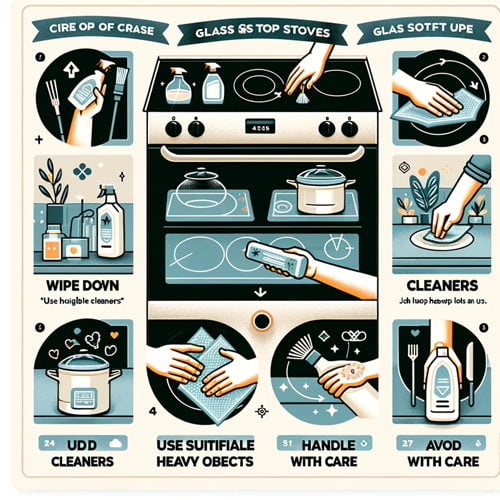
Troubleshooting Tips
Uneven Cooking
- Problem: The pressure cooker doesn’t cook food evenly on the glass-top stove.
- Solution: Ensure that the cooker is centered on the burner and the heat is properly adjusted. A diffuser can also be used to distribute heat more evenly.
Pressure Cooker Not Sealing Properly
- Problem: The cooker isn’t building up pressure as it should.
- Solution: Check the gasket and the valves. Replace the gasket if it’s worn out, and clean any food residue from the valves.
Scratches on the Glass Top
- Problem: Finding scratches on the glass top after using the pressure cooker.
- Solution: In future use, be careful to lift rather than slide the cooker. Use a protective cooking pad if necessary. For existing scratches, a glass cooktop polish might help reduce their appearance.
The cook takes longer to Heat Up
- Problem: The pressure cooker is slow to heat on the glass stove top.
- Solution: This could be due to the thickness of the cooker’s base. Preheating the cooker for a short period before adding food can help. Also, ensure the burner size matches the cooker’s base size.
Stains or Burn Marks on Stove
- Problem: Stains or burn marks appear on the glass top after using the pressure cooker.
- Solution: Clean the stove top immediately after use once it’s cooled down. For tough stains, use a cleaner specifically designed for glass-top stoves.
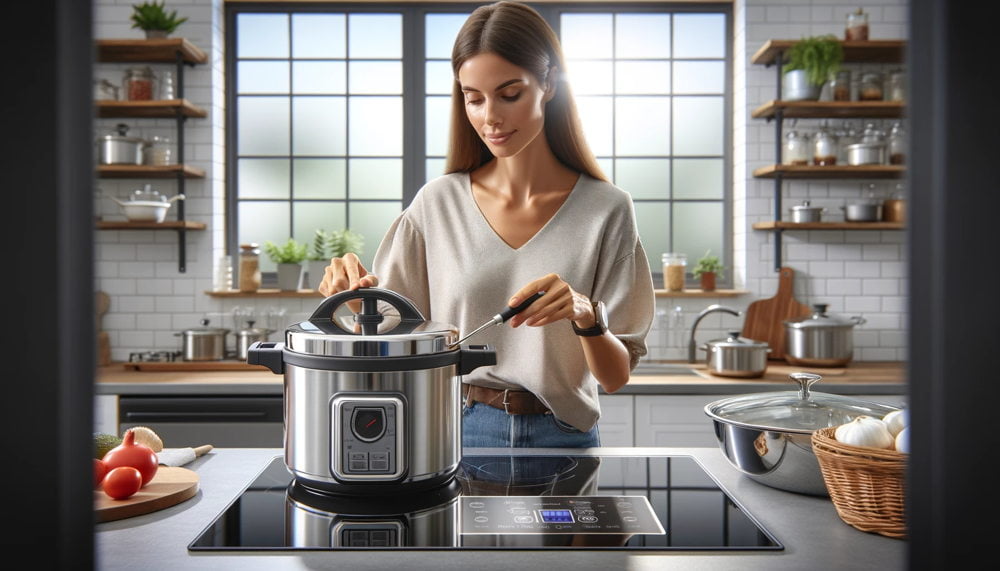
FAQs: Common Questions
Can all pressure cookers be used on glass-top stoves?
Answer: Not all pressure cookers are suitable for glass-top stoves. It’s essential to choose models with a flat base for even heat distribution and avoid overly heavy cookers that could damage the stove.
How Do I Prevent Scratching My Glass Top Stove When Using a Pressure Cooker?
Answer: To avoid scratches, always lift the pressure cooker instead of sliding it across the surface. Also, ensure the bottom of the cooker is clean and free of debris before placing it on the stove.
Is It Safe to Use High Heat with a Pressure Cooker on a Glass Top Stove?
Answer: It’s safer to start with medium heat and adjust as needed. High heat can cause damage to both the pressure cooker and the stove. It’s also important to monitor the cooking process to avoid overheating.
How Can I Tell if My Pressure Cooker is Suitable for a Glass Top Stove?
Answer: Check the manufacturer’s instructions. Cookers suitable for glass-top stoves usually have specific design features like a flat, smooth base and are not excessively heavy.
Can the weight of a pressure cooker crack a glass-top stove?
Answer: Yes, if the cooker is too heavy. It’s important to choose a model that’s light enough to be safe for your specific stove.
Let’s recheck our top choices:
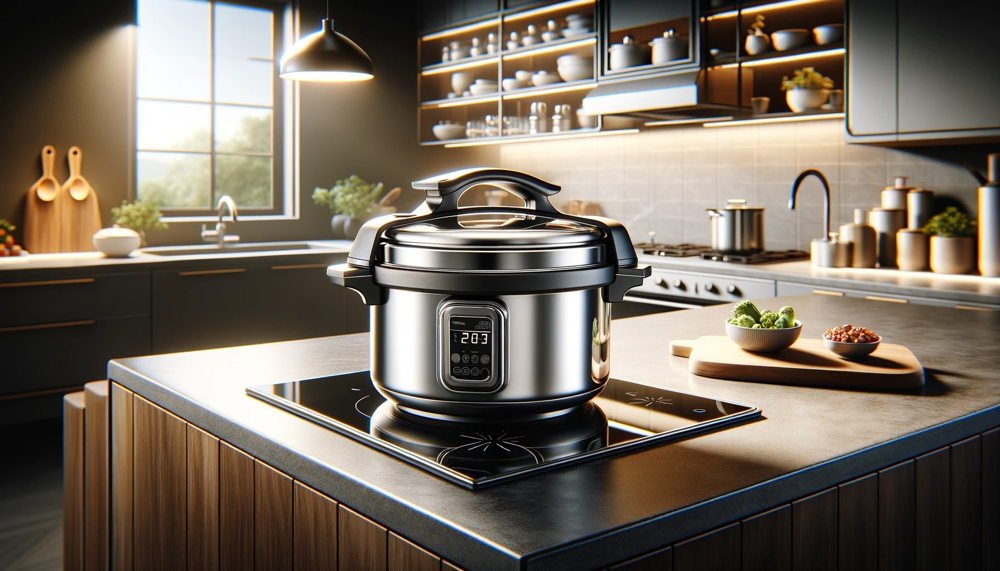
Conclusion
Finding the best pressure cooker for glass-top stoves requires careful consideration of various factors, such as the cooker’s weight, base design, and material. The ideal pressure cooker not only enhances the functionality and aesthetics of your modern kitchen but also ensures the safety and longevity of your glass-top stove.
With the right choice, you can enjoy the myriad benefits of pressure cooking—efficiency, flavor, and nutritional value—while maintaining the pristine condition of your glass-top stove. Remember, the best pressure cooker for glass-top stoves is one that aligns perfectly with your cooking needs and kitchen style.
 https://bistrovivant.com is a participant in the Amazon Services LLC Associates Program, an affiliate advertising program designed to provide a means for website owners to earn advertising fees by advertising and linking to Amazon (.com,.co.uk,.ca, etc.) and any other website that may be affiliated with the Amazon Service LLC Associates Program. As an Amazon Associate, I earn from qualifying purchases.
https://bistrovivant.com is a participant in the Amazon Services LLC Associates Program, an affiliate advertising program designed to provide a means for website owners to earn advertising fees by advertising and linking to Amazon (.com,.co.uk,.ca, etc.) and any other website that may be affiliated with the Amazon Service LLC Associates Program. As an Amazon Associate, I earn from qualifying purchases.

